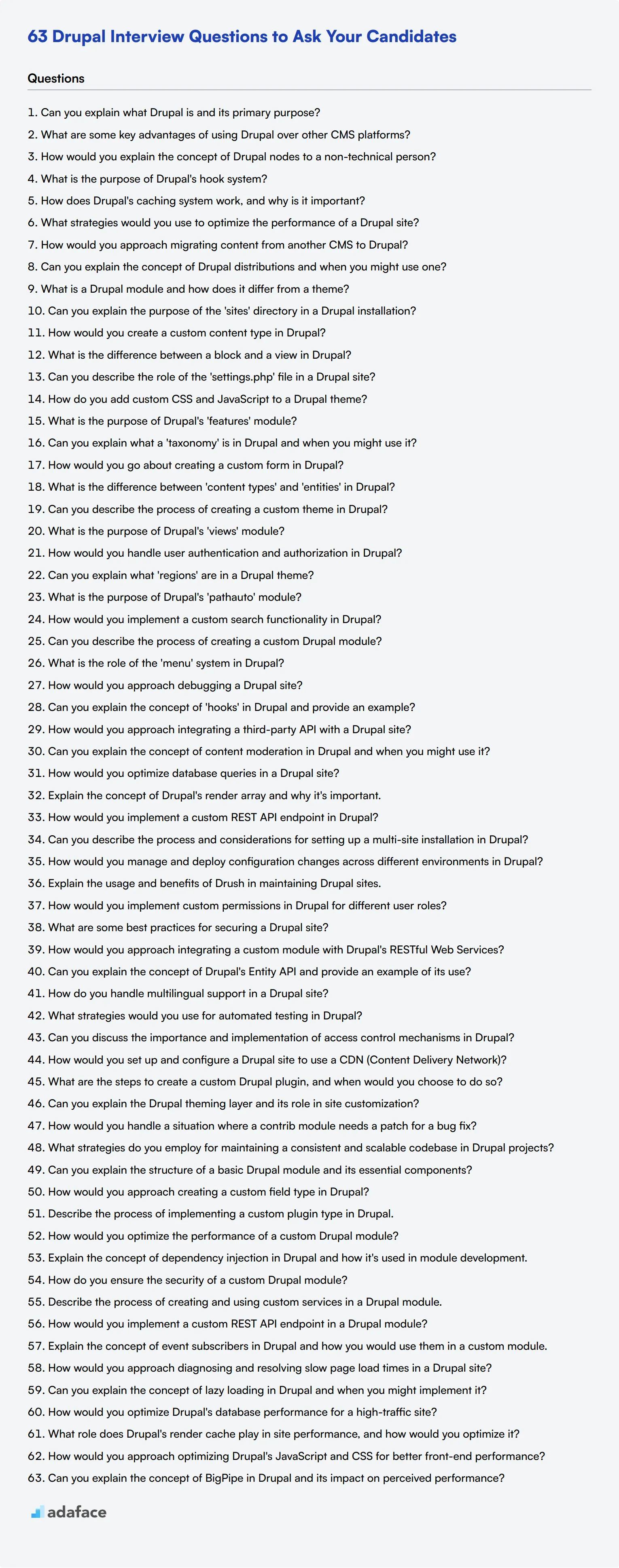Interviewing Drupal developers requires a deep understanding of the platform's intricacies and the ability to assess a candidate's proficiency across various skill levels. By asking the right questions, you can evaluate a candidate's expertise and determine if they're the right fit for your team.
This comprehensive guide provides a curated list of Drupal interview questions tailored for different experience levels, from junior to senior developers. We've organized the questions into categories covering general Drupal knowledge, module development, and site performance optimization.
Using these questions will help you identify top Drupal talent and make informed hiring decisions. Consider complementing your interview process with a Drupal skills assessment to get a more complete picture of a candidate's capabilities.
Table of contents
8 general Drupal interview questions and answers
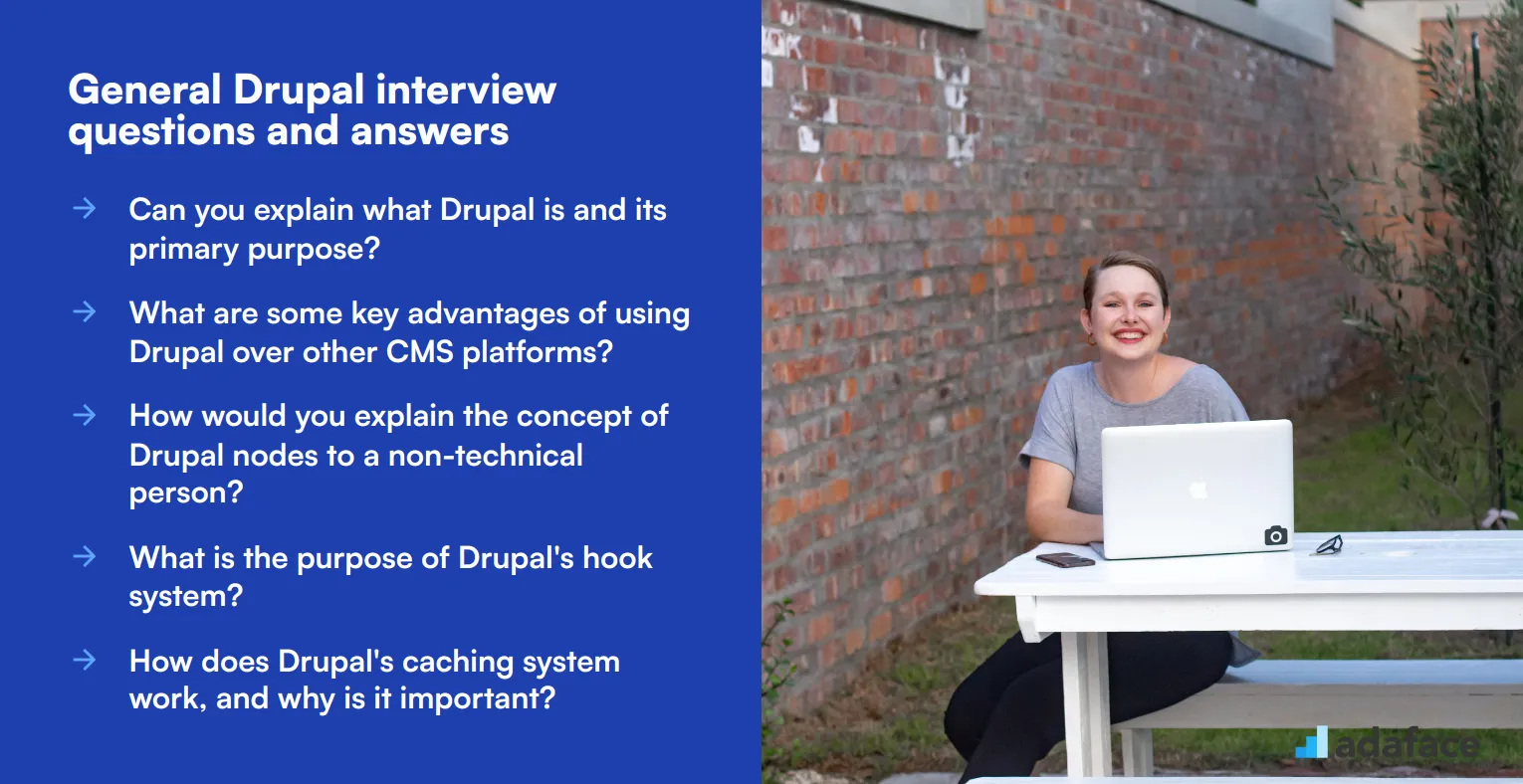
Ready to dive into the world of Drupal interviews? These 8 general questions will help you gauge a candidate's understanding of this powerful content management system. Use them to spark insightful discussions and uncover the true potential of your Drupal developer candidates. Remember, the goal is to assess both technical know-how and problem-solving skills!
1. Can you explain what Drupal is and its primary purpose?
Drupal is an open-source content management system (CMS) and web application framework. Its primary purpose is to allow organizations and individuals to build and manage websites easily without needing extensive coding knowledge.
A strong answer should highlight Drupal's flexibility, scalability, and robust community support. Look for candidates who mention its modular architecture, which allows for easy customization and extension of functionality through modules and themes.
2. What are some key advantages of using Drupal over other CMS platforms?
Some key advantages of Drupal include:
- Flexibility and scalability for handling complex, content-rich websites
- Strong security features and regular updates
- Large, active community providing support and contributions
- Extensive library of modules for added functionality
- SEO-friendly structure and features
- Multi-site capabilities for managing multiple websites from a single codebase
Look for candidates who can explain these advantages in the context of real-world scenarios. They should be able to articulate why Drupal might be chosen over other CMS options for specific project requirements.
3. How would you explain the concept of Drupal nodes to a non-technical person?
A good explanation might compare nodes to individual pages or pieces of content on a website. Each node represents a distinct unit of information, like a blog post, article, or product listing.
Candidates should emphasize that nodes are the basic building blocks of content in Drupal, each with its own unique ID, title, and content type. They might use an analogy, such as comparing nodes to different types of Lego blocks that can be assembled to create a complete website structure.
Look for answers that demonstrate the ability to communicate technical concepts clearly to non-technical stakeholders, as this is a valuable skill for any Drupal developer.
4. What is the purpose of Drupal's hook system?
Drupal's hook system is a powerful feature that allows modules to interact with and modify Drupal's core functionality without altering the core code. Hooks are essentially functions that modules can implement to 'hook into' various processes and events within Drupal.
A strong answer should explain that hooks enable developers to:
- Extend and customize Drupal's behavior
- React to specific events or actions in the system
- Modify data before it's saved or displayed
- Add new functionality to existing features
Look for candidates who can provide examples of common hooks (like hook_form_alter or hook_node_view) and explain how they might use hooks to solve real-world development challenges.
5. How does Drupal's caching system work, and why is it important?
Drupal's caching system is designed to improve website performance by storing frequently accessed data and reducing the need for repeated database queries or complex calculations. It works at various levels, including page caching, block caching, and views caching.
A comprehensive answer should cover:
- Different types of caching in Drupal (e.g., internal page cache, dynamic page cache)
- How caching reduces server load and improves response times
- The importance of cache clearing when making site changes
- Challenges of caching in dynamic content scenarios
Evaluate the candidate's understanding of performance optimization and their ability to balance caching benefits with the need for up-to-date content delivery.
6. What strategies would you use to optimize the performance of a Drupal site?
Optimizing a Drupal site's performance involves various strategies:
- Implementing effective caching mechanisms
- Minimizing the use of resource-intensive modules
- Optimizing database queries
- Using content delivery networks (CDNs)
- Configuring proper server settings
- Optimizing images and other media
- Leveraging lazy loading for content
Look for candidates who can explain these strategies in detail and discuss how they would prioritize optimizations based on the specific needs of a project. The ability to balance performance improvements with maintainability and user experience is crucial for a skilled web developer.
7. How would you approach migrating content from another CMS to Drupal?
Migrating content to Drupal requires a structured approach:
- Analyze the source data structure and content types
- Map the source data to Drupal's content structure
- Use Drupal's Migrate API or contrib modules like Migrate Plus
- Create custom migration plugins if needed
- Test the migration process thoroughly
- Plan for handling media files and user accounts
- Consider SEO implications, such as URL redirects
Evaluate the candidate's experience with complex data migrations and their ability to anticipate and solve potential challenges. Look for answers that emphasize the importance of preserving data integrity and maintaining SEO value during the migration process.
8. Can you explain the concept of Drupal distributions and when you might use one?
Drupal distributions are pre-packaged Drupal cores that come with a set of modules, themes, and pre-configured settings to serve a specific purpose or industry need. They provide a quick starting point for building websites with specific functionality.
Candidates should mention popular distributions like Commerce Kickstart for e-commerce sites or OpenEDU for educational institutions. They should explain that distributions can save development time and provide standardized solutions for common use cases.
Look for answers that demonstrate an understanding of when to use a distribution versus building from scratch, considering factors like project requirements, customization needs, and long-term maintenance.
20 Drupal interview questions to ask junior developers
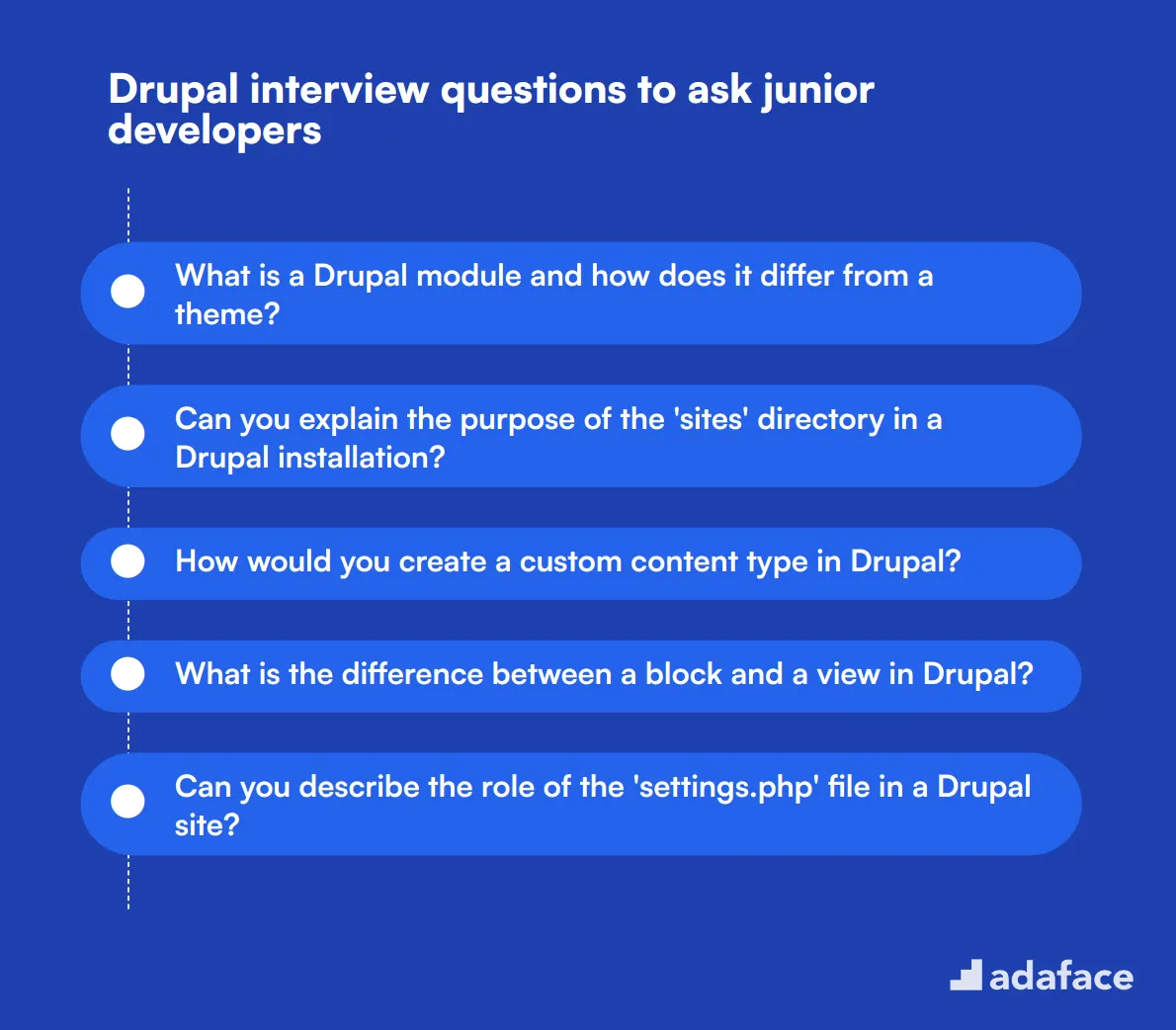
To assess the foundational knowledge of junior Drupal developers, use these 20 interview questions. They cover essential concepts and practical skills, helping you identify candidates with a solid grasp of Drupal basics and potential for growth.
- What is a Drupal module and how does it differ from a theme?
- Can you explain the purpose of the 'sites' directory in a Drupal installation?
- How would you create a custom content type in Drupal?
- What is the difference between a block and a view in Drupal?
- Can you describe the role of the 'settings.php' file in a Drupal site?
- How do you add custom CSS and JavaScript to a Drupal theme?
- What is the purpose of Drupal's 'features' module?
- Can you explain what a 'taxonomy' is in Drupal and when you might use it?
- How would you go about creating a custom form in Drupal?
- What is the difference between 'content types' and 'entities' in Drupal?
- Can you describe the process of creating a custom theme in Drupal?
- What is the purpose of Drupal's 'views' module?
- How would you handle user authentication and authorization in Drupal?
- Can you explain what 'regions' are in a Drupal theme?
- What is the purpose of Drupal's 'pathauto' module?
- How would you implement a custom search functionality in Drupal?
- Can you describe the process of creating a custom Drupal module?
- What is the role of the 'menu' system in Drupal?
- How would you approach debugging a Drupal site?
- Can you explain the concept of 'hooks' in Drupal and provide an example?
5 intermediate Drupal interview questions and answers to ask mid-tier developers
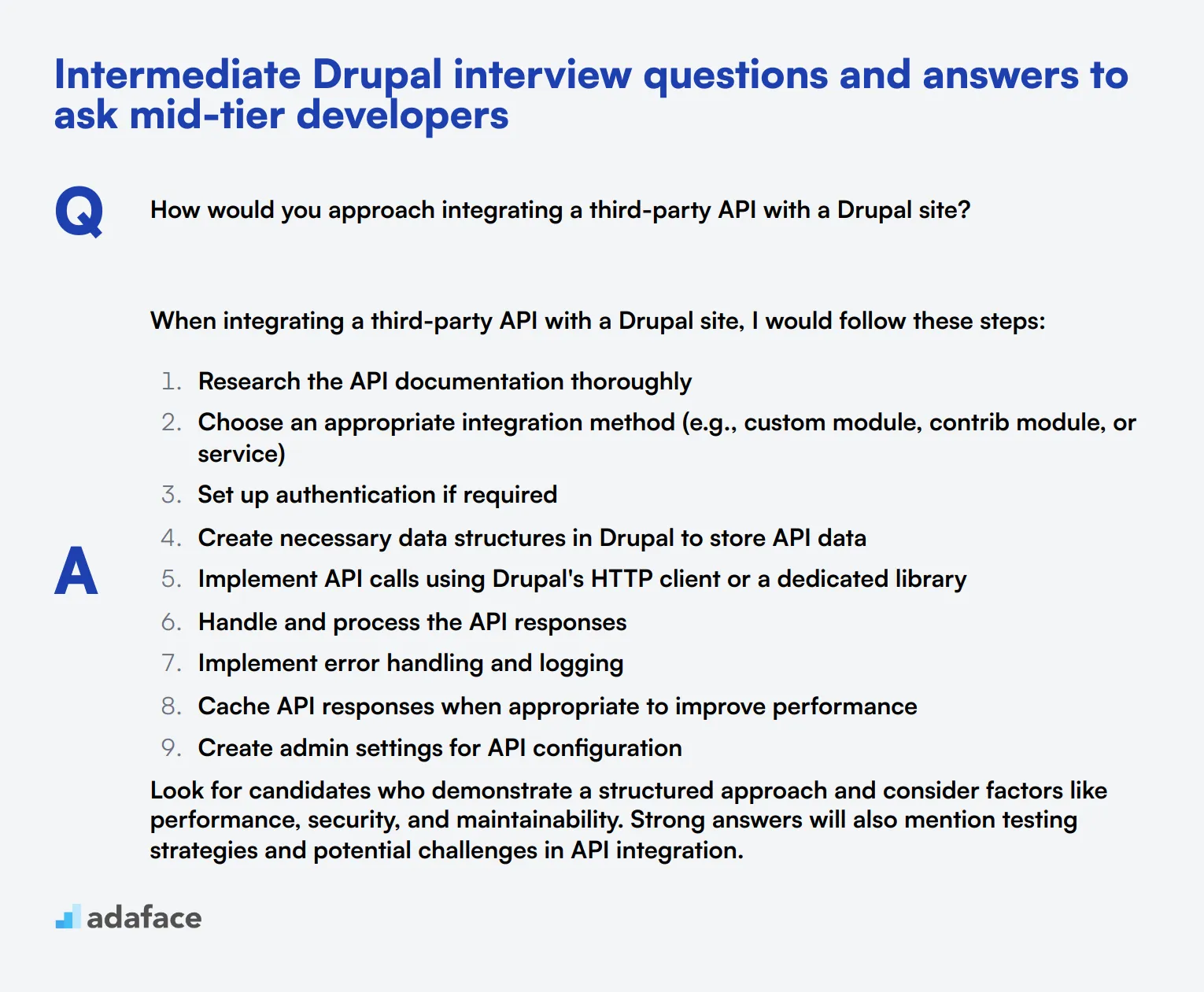
Ready to dive deeper into Drupal's intricacies? These intermediate questions are perfect for assessing mid-tier developers who've moved beyond the basics. Use them to gauge a candidate's practical knowledge and problem-solving skills in real-world Drupal scenarios. Remember, the best technical recruiters know how to balance technical prowess with cultural fit!
1. How would you approach integrating a third-party API with a Drupal site?
When integrating a third-party API with a Drupal site, I would follow these steps:
- Research the API documentation thoroughly
- Choose an appropriate integration method (e.g., custom module, contrib module, or service)
- Set up authentication if required
- Create necessary data structures in Drupal to store API data
- Implement API calls using Drupal's HTTP client or a dedicated library
- Handle and process the API responses
- Implement error handling and logging
- Cache API responses when appropriate to improve performance
- Create admin settings for API configuration
Look for candidates who demonstrate a structured approach and consider factors like performance, security, and maintainability. Strong answers will also mention testing strategies and potential challenges in API integration.
2. Can you explain the concept of content moderation in Drupal and when you might use it?
Content moderation in Drupal is a workflow management system that allows for the review and approval of content before it's published. It's particularly useful for sites with multiple content creators or those requiring strict editorial control.
Key features of content moderation include:
- Multiple content states (e.g., draft, review, published)
- Customizable workflows
- Role-based permissions for different moderation actions
- Revision tracking
- Scheduled publishing
Look for candidates who can explain real-world scenarios where content moderation is beneficial, such as in large organizations, news websites, or any site with sensitive content. They should also be able to discuss potential challenges in implementing moderation workflows and how to overcome them.
3. How would you optimize database queries in a Drupal site?
Optimizing database queries in Drupal involves several strategies:
- Use Drupal's Database API and avoid raw SQL when possible
- Implement proper indexing on frequently queried fields
- Utilize Drupal's caching system to reduce database load
- Use 'lazy loading' techniques to fetch only necessary data
- Implement pagination for large result sets
- Use Drupal's Entity Query API for efficient entity queries
- Optimize Views queries by removing unnecessary relationships and fields
- Use the 'Query Alter' hook to modify and optimize complex queries
- Regularly analyze and optimize the database using tools like MySQLTuner
A strong candidate should demonstrate understanding of both Drupal-specific optimization techniques and general database optimization principles. Look for answers that balance performance improvements with maintainability and Drupal best practices.
4. Explain the concept of Drupal's render array and why it's important.
A render array in Drupal is a structured array that defines how content should be rendered on a page. It's a crucial concept in Drupal's theming system, allowing for flexible and dynamic content presentation.
Key aspects of render arrays include:
- Hierarchical structure representing the layout
- Separation of data and presentation logic
- Ability to alter content before rendering
- Cacheable elements for improved performance
- Integration with Drupal's theme system
Look for candidates who can explain how render arrays contribute to Drupal's flexibility and themability. They should be able to discuss practical examples of working with render arrays and how they differ from direct output of HTML. Strong answers might also touch on performance benefits and how render arrays facilitate responsive design.
5. How would you implement a custom REST API endpoint in Drupal?
Implementing a custom REST API endpoint in Drupal involves several steps:
- Create a custom module
- Define the route for the API endpoint
- Create a controller class to handle the request
- Implement the necessary logic to process the request and prepare the response
- Use Drupal's serialization API to format the response (e.g., JSON)
- Configure access controls and authentication if required
- Implement error handling and appropriate HTTP status codes
- Document the API for other developers
A strong candidate should demonstrate familiarity with Drupal's REST module and RESTful principles. Look for answers that consider security, performance, and adherence to REST best practices. They should also be able to discuss potential use cases for custom API endpoints in a Drupal project.
15 advanced Drupal interview questions to ask senior developers
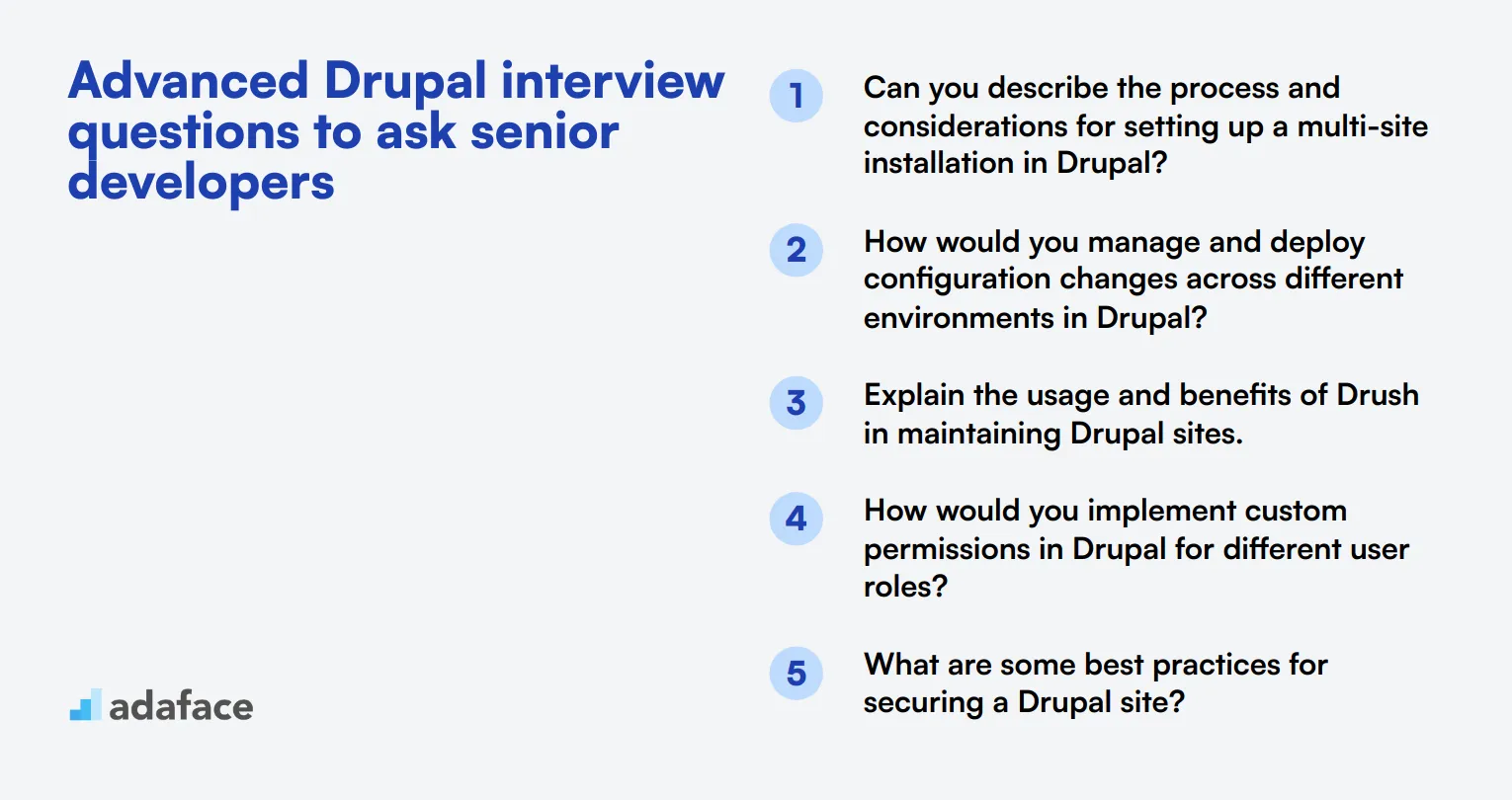
To ensure your candidates possess the necessary expertise for advanced Drupal roles, you can use these interview questions. This list is crafted to help you identify top talent who can handle complex tasks and drive your projects forward. For more details on specific roles, you may want to refer to our back-end Drupal developer job description.
- Can you describe the process and considerations for setting up a multi-site installation in Drupal?
- How would you manage and deploy configuration changes across different environments in Drupal?
- Explain the usage and benefits of Drush in maintaining Drupal sites.
- How would you implement custom permissions in Drupal for different user roles?
- What are some best practices for securing a Drupal site?
- How would you approach integrating a custom module with Drupal's RESTful Web Services?
- Can you explain the concept of Drupal's Entity API and provide an example of its use?
- How do you handle multilingual support in a Drupal site?
- What strategies would you use for automated testing in Drupal?
- Can you discuss the importance and implementation of access control mechanisms in Drupal?
- How would you set up and configure a Drupal site to use a CDN (Content Delivery Network)?
- What are the steps to create a custom Drupal plugin, and when would you choose to do so?
- Can you explain the Drupal theming layer and its role in site customization?
- How would you handle a situation where a contrib module needs a patch for a bug fix?
- What strategies do you employ for maintaining a consistent and scalable codebase in Drupal projects?
9 Drupal interview questions and answers related to module development
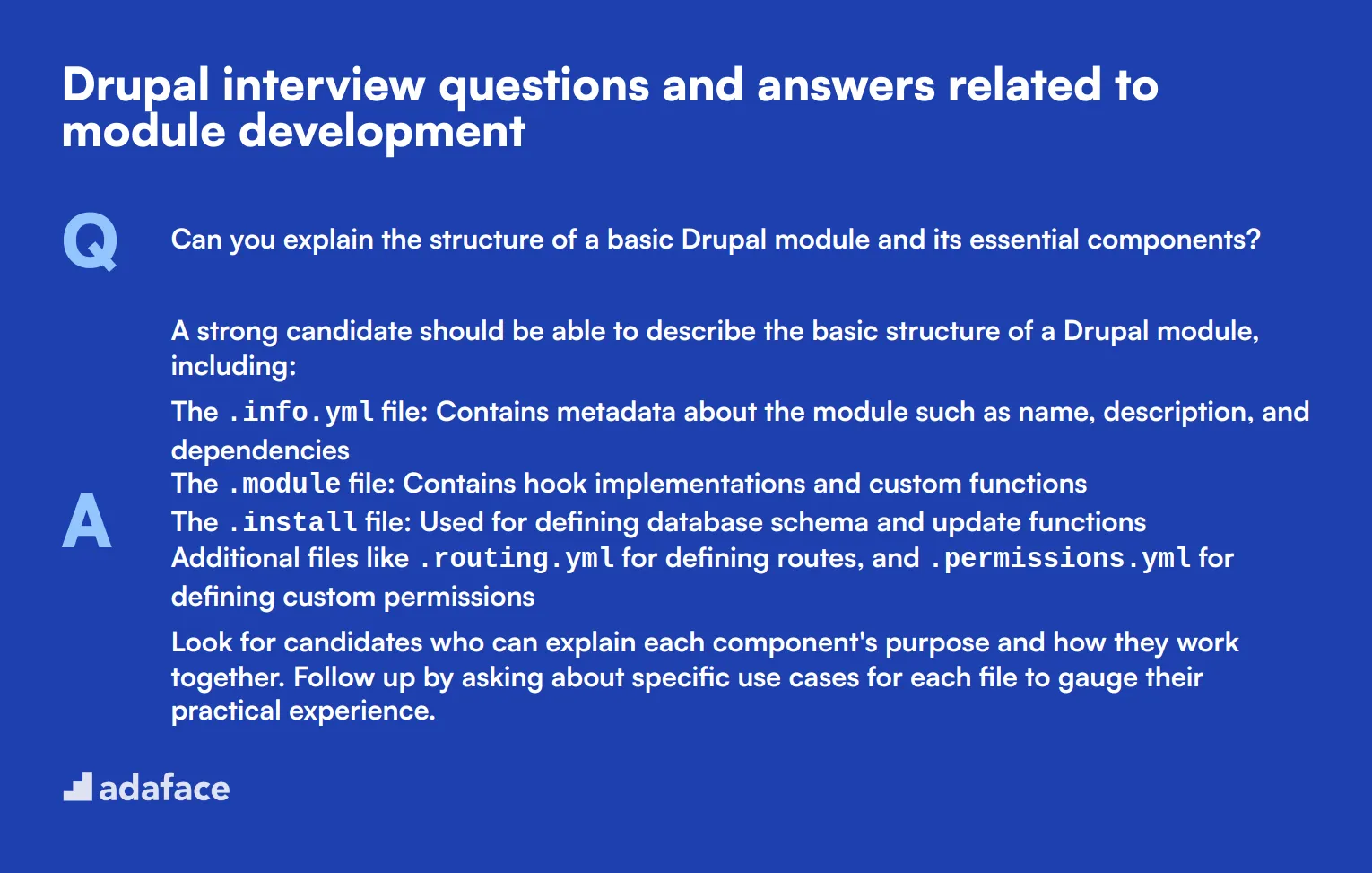
When interviewing for Drupal module development roles, it's crucial to assess candidates' understanding of core concepts and best practices. These 9 questions will help you gauge a candidate's expertise in module development and their ability to create efficient, scalable solutions. Use them to spark insightful discussions and evaluate problem-solving skills.
1. Can you explain the structure of a basic Drupal module and its essential components?
A strong candidate should be able to describe the basic structure of a Drupal module, including:
- The
.info.ymlfile: Contains metadata about the module such as name, description, and dependencies - The
.modulefile: Contains hook implementations and custom functions - The
.installfile: Used for defining database schema and update functions - Additional files like
.routing.ymlfor defining routes, and.permissions.ymlfor defining custom permissions
Look for candidates who can explain each component's purpose and how they work together. Follow up by asking about specific use cases for each file to gauge their practical experience.
2. How would you approach creating a custom field type in Drupal?
A knowledgeable candidate should outline the following steps:
- Create a new module
- Implement
hook_field_info()to define the field type - Implement
hook_field_schema()to define the database schema - Create field widget and formatter classes
- Implement
hook_field_widget_info_alter()andhook_field_formatter_info_alter()to register the widget and formatter - Implement any necessary validation and processing logic
Pay attention to candidates who mention the importance of following Drupal coding standards and best practices. Ask them about any challenges they've faced when creating custom field types in the past.
3. Describe the process of implementing a custom plugin type in Drupal.
An experienced developer should be able to explain the following steps:
- Define the plugin manager service in a
.services.ymlfile - Create a plugin manager class that extends
DefaultPluginManager - Define the plugin interface and base class
- Create the plugin annotation class
- Implement individual plugin classes
- Use the plugin manager to discover and instantiate plugins
Look for candidates who can explain the purpose of each step and discuss the benefits of using the plugin system, such as flexibility and extensibility. Consider asking about real-world scenarios where they've implemented custom plugin types.
4. How would you optimize the performance of a custom Drupal module?
A strong candidate should mention several optimization techniques, such as:
- Implementing caching strategies using Drupal's Cache API
- Minimizing database queries and optimizing existing ones
- Using lazy loading for expensive operations
- Implementing efficient hook implementations
- Leveraging Drupal's render arrays and avoiding direct output
Pay attention to candidates who emphasize the importance of profiling and benchmarking to identify performance bottlenecks. Ask them about specific tools or methods they've used to measure and improve module performance.
5. Explain the concept of dependency injection in Drupal and how it's used in module development.
A knowledgeable candidate should be able to explain that dependency injection is a design pattern used to increase modularity and testability by passing dependencies to a class instead of creating them internally.
They should mention that Drupal uses a service container to manage dependencies and services. Key points to look for include:
- Understanding of service definitions in
.services.ymlfiles - Knowledge of how to inject services into classes using constructor injection
- Familiarity with the
@injectannotation for property injection - Awareness of the benefits of dependency injection, such as easier testing and looser coupling
Consider asking for examples of how they've used dependency injection in their own modules to gauge their practical experience with the concept.
6. How do you ensure the security of a custom Drupal module?
A security-conscious candidate should mention several important practices:
- Sanitizing user input using Drupal's built-in functions like
check_plain()andfilter_xss() - Implementing proper access checks using Drupal's permission system
- Using prepared statements or Drupal's database API to prevent SQL injection
- Following Drupal's coding standards and security best practices
- Regularly updating the module and its dependencies
- Implementing CSRF protection using form tokens
Look for candidates who emphasize the importance of security throughout the development process, not just as an afterthought. Ask them about any security vulnerabilities they've encountered or fixed in Drupal modules.
7. Describe the process of creating and using custom services in a Drupal module.
An experienced developer should outline the following steps:
- Define the service in the module's
.services.ymlfile - Create the service class with the required methods
- Use dependency injection to inject any required services into the new service
- Use the service in other parts of the module by injecting it or accessing it through the service container
Look for candidates who can explain the benefits of using services, such as improved modularity and reusability. Ask them about real-world scenarios where they've created custom services and how they've integrated them with other Drupal components.
8. How would you implement a custom REST API endpoint in a Drupal module?
A knowledgeable candidate should describe the following process:
- Define the route for the API endpoint in the module's
.routing.ymlfile - Create a controller class to handle the API logic
- Implement the necessary HTTP methods (GET, POST, etc.) in the controller
- Use Drupal's serialization API to format the response
- Implement proper access checks and authentication if required
- Test the API endpoint using tools like Postman or cURL
Pay attention to candidates who mention the importance of following RESTful principles and Drupal's API standards. Ask them about any challenges they've faced when implementing custom API endpoints and how they've addressed them.
9. Explain the concept of event subscribers in Drupal and how you would use them in a custom module.
A strong candidate should be able to explain that event subscribers are a way to react to specific events that occur within Drupal, allowing for modular and extensible code.
They should outline the process of creating an event subscriber:
- Create an event subscriber class that implements
EventSubscriberInterface - Define the
getSubscribedEvents()method to specify which events to listen for - Implement the methods that will be called when the events occur
- Register the event subscriber as a service in the module's
.services.ymlfile with theevent_subscribertag
Look for candidates who can provide examples of when to use event subscribers, such as altering entity data before saving or modifying responses before they're sent to the browser. Ask them about specific events they've worked with in their Drupal projects.
6 Drupal interview questions and answers related to site performance
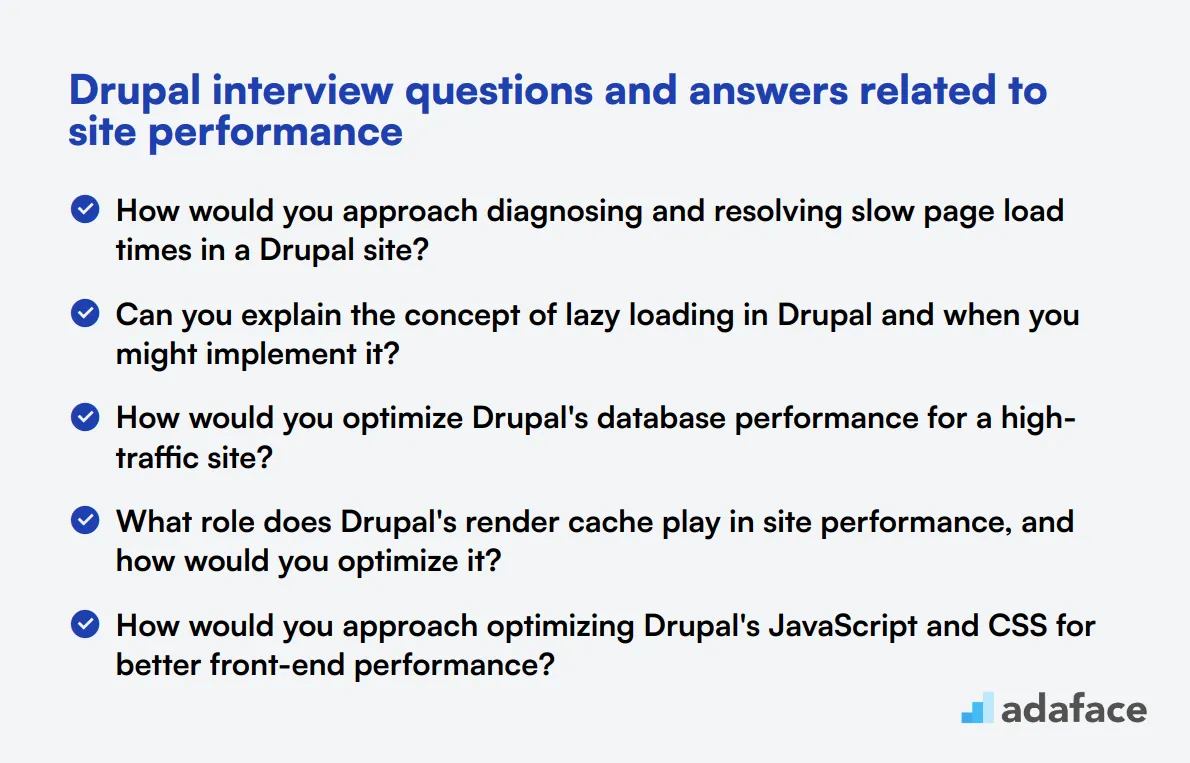
When interviewing for Drupal positions, it's crucial to assess candidates' understanding of site performance optimization. These questions will help you gauge a candidate's ability to create fast, efficient Drupal sites. Use them to identify skilled developers who can deliver high-performing web experiences.
1. How would you approach diagnosing and resolving slow page load times in a Drupal site?
A strong candidate should outline a systematic approach to diagnosing and resolving slow page load times in Drupal. They might mention the following steps:
- Use performance profiling tools like New Relic or Blackfire to identify bottlenecks
- Check server response time and optimize database queries
- Analyze and optimize Drupal's caching mechanisms
- Review and optimize third-party modules
- Implement front-end optimizations like minification and compression
- Consider using a Content Delivery Network (CDN) for static assets
Look for candidates who demonstrate a methodical approach and familiarity with various performance optimization techniques specific to Drupal. Follow up by asking about their experience with specific tools or challenging performance issues they've encountered.
2. Can you explain the concept of lazy loading in Drupal and when you might implement it?
Lazy loading in Drupal is a technique used to defer the loading of non-critical resources at page load time. Instead, these resources are loaded only when needed, typically when they come into the viewport. This can significantly improve initial page load times, especially for content-heavy pages.
Candidates should mention that lazy loading is particularly useful for:
- Images on long pages or image galleries
- Complex widgets or embedded content
- Comments sections on articles
- Infinite scroll implementations
Look for answers that demonstrate an understanding of the performance benefits and potential trade-offs of lazy loading. Strong candidates might also mention specific Drupal modules or techniques for implementing lazy loading.
3. How would you optimize Drupal's database performance for a high-traffic site?
Optimizing Drupal's database performance is crucial for maintaining a responsive site under high traffic. A knowledgeable candidate should discuss several strategies:
- Implement query caching to reduce repeated database calls
- Use database indexing effectively on frequently queried fields
- Optimize database table structures and consider denormalization where appropriate
- Implement database connection pooling to manage concurrent connections
- Regularly analyze and optimize slow queries using tools like MySQL's EXPLAIN
- Consider database sharding for extremely high-traffic scenarios
Look for candidates who not only list these strategies but can also explain the reasoning behind each one and discuss potential trade-offs. Ask follow-up questions about their experience implementing these optimizations in real-world scenarios.
4. What role does Drupal's render cache play in site performance, and how would you optimize it?
Drupal's render cache plays a crucial role in improving site performance by storing the rendered output of expensive operations. This allows Drupal to serve cached content quickly without repeating the rendering process for each request.
To optimize the render cache, candidates might suggest:
- Configuring cache tags and contexts appropriately
- Implementing custom cache backends for better performance
- Using cache bubbling to invalidate only necessary cache items
- Leveraging the #cache property in render arrays
- Implementing time-based cache expiration where appropriate
Look for answers that demonstrate a deep understanding of Drupal's caching system and the ability to fine-tune it for optimal performance. Strong candidates might also discuss strategies for measuring the effectiveness of caching optimizations.
5. How would you approach optimizing Drupal's JavaScript and CSS for better front-end performance?
Optimizing JavaScript and CSS is crucial for improving a Drupal site's front-end performance. A strong candidate should discuss several strategies:
- Aggregation and minification of JS and CSS files
- Implementing critical CSS techniques
- Deferring non-critical JavaScript loading
- Using Drupal's built-in libraries system effectively
- Implementing asynchronous loading for certain scripts
- Optimizing third-party scripts and considering self-hosting when possible
Look for candidates who not only list these techniques but can also explain how to implement them in Drupal specifically. They should demonstrate an understanding of the balance between performance optimization and maintainability of the codebase.
6. Can you explain the concept of BigPipe in Drupal and its impact on perceived performance?
BigPipe is a performance optimization technique in Drupal that improves the perceived loading time of pages. It works by sending the main content of the page quickly, while progressively loading less critical parts of the page afterwards.
Candidates should explain that BigPipe:
- Separates a page into cacheable and dynamic parts
- Sends the cacheable parts immediately
- Streams the dynamic parts as they become available
- Improves Time to First Byte (TTFB) and perceived performance
Look for answers that demonstrate an understanding of how BigPipe works under the hood and its benefits for user experience. Strong candidates might also discuss scenarios where BigPipe is particularly effective and any potential limitations or considerations when implementing it.
Which Drupal skills should you evaluate during the interview phase?
Evaluating all aspects of a candidate's skill set during a single interview is not feasible. However, for Drupal roles, there are several key skills that are essential to assess to ensure the candidate can handle the technical challenges they will face.
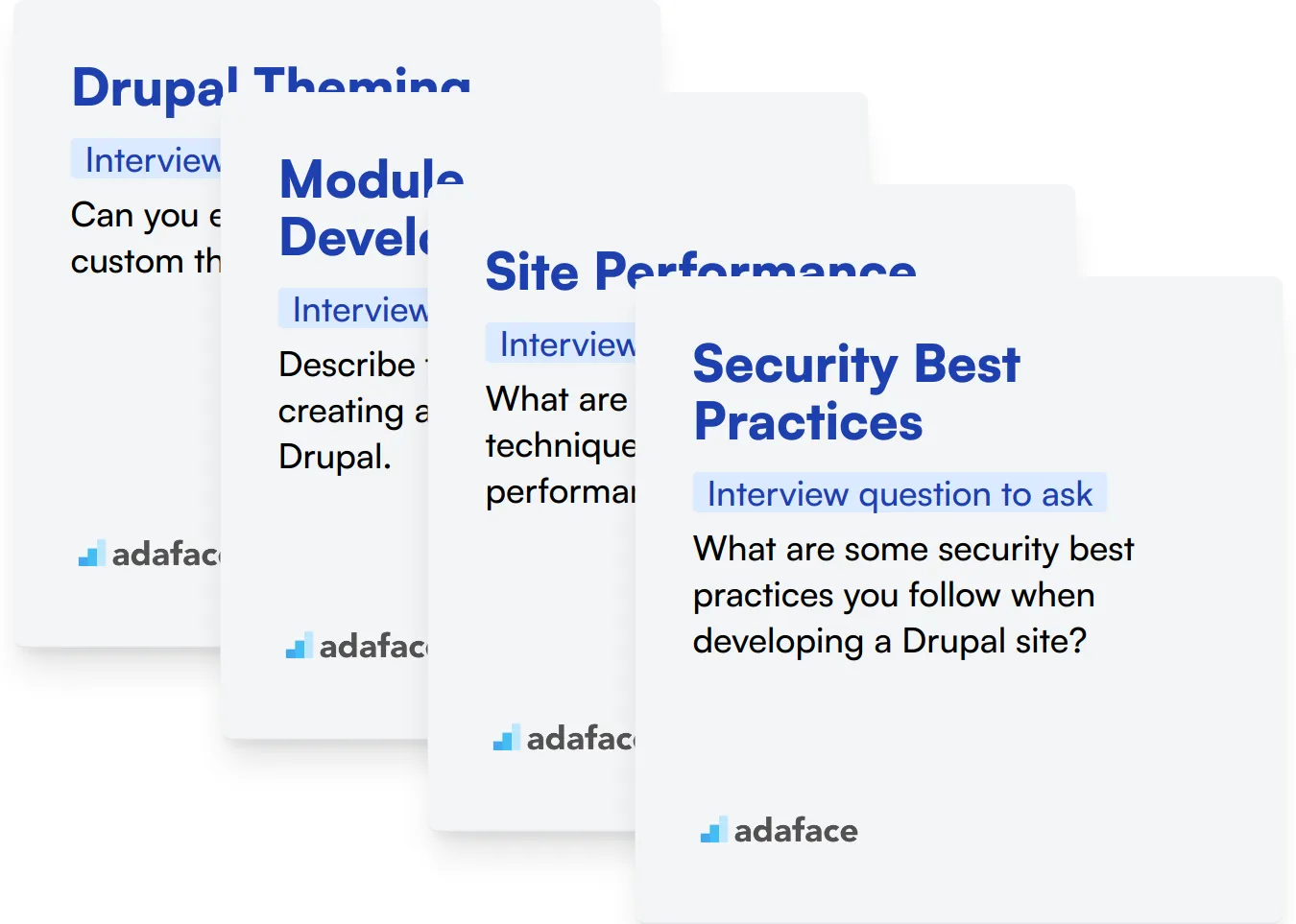
Drupal Theming
Drupal Theming is critical because it directly impacts the user interface and user experience. A candidate who excels in theming will be able to create visually appealing and highly functional websites.
You can use our Drupal Test to evaluate a candidate’s theming skills through relevant MCQs.
Another effective approach is to ask targeted interview questions to gauge their proficiency in theming.
Can you explain how to create a custom theme in Drupal?
Look for candidates who can explain the process clearly, mentioning key steps like creating the info.yml file, setting up the directory structure, and integrating CSS/JS files.
Module Development
Module Development is crucial for extending Drupal's functionality. Proficiency in this area indicates that the candidate can build custom modules to meet specific business requirements.
Assessing module development skills can be efficiently done with our Drupal Test.
You can also ask direct questions to evaluate their practical experience with module development.
Describe the steps involved in creating a custom module in Drupal.
Expect detailed responses that cover creating a .info.yml file, defining module hooks, and implementing the module's business logic.
Site Performance
Understanding Site Performance is vital for maintaining an optimized and fast-loading Drupal site, which directly influences user satisfaction and SEO rankings.
Our Drupal Test includes questions that assess knowledge in optimizing Drupal site performance.
Probe deeper into their performance optimization knowledge by asking specific questions.
What are some common techniques you use to improve the performance of a Drupal site?
Look for answers that include caching strategies, optimizing database queries, and minimizing HTTP requests.
Security Best Practices
Security Best Practices in Drupal are essential to protect the site from common threats and vulnerabilities. A candidate who has strong security skills will ensure that the website is robust against attacks.
To assess their understanding, ask questions focused on security measures and practices.
What are some security best practices you follow when developing a Drupal site?
Candidates should mention practices like regular updates, using secure coding practices, and implementing access controls.
Tips for Effective Drupal Interview Questioning
Before putting your newfound knowledge into practice, consider these tips to make your Drupal interviews more effective and insightful.
1. Implement Skills Tests Before Interviews
Skills tests provide an objective measure of a candidate's Drupal proficiency before the interview stage. They help filter out unqualified candidates and focus your time on the most promising applicants.
Consider using a Drupal online test to evaluate core Drupal skills. For a more comprehensive assessment, you might also include tests for PHP, JavaScript, and HTML, as these are often used in Drupal development.
Implementing these tests can significantly streamline your hiring process. They provide data-driven insights into a candidate's technical abilities, allowing you to tailor your interview questions based on their test performance.
2. Prepare a Balanced Set of Interview Questions
With limited interview time, it's crucial to ask the right questions. Focus on a mix of technical Drupal questions and questions that assess problem-solving skills and cultural fit.
Consider including questions about related technologies like MySQL or Apache, as these are often used in Drupal environments. You might also want to explore a candidate's experience with version control systems like Git.
Don't forget to assess soft skills. Include questions about teamwork, communication, and project management to get a well-rounded view of the candidate.
3. Master the Art of Follow-Up Questions
Asking follow-up questions is key to understanding a candidate's depth of knowledge. It helps you differentiate between those who have memorized answers and those with genuine understanding and experience.
For example, if a candidate mentions experience with Drupal modules, ask them to explain the process of creating a custom module. Look for detailed responses that demonstrate hands-on experience and problem-solving skills.
Use Drupal interview questions and skills tests to hire talented Drupal developers
If you are looking to hire someone with Drupal skills, it's important to accurately assess their capabilities. The most effective way to do this is by utilizing skills tests such as the Drupal online test.
Once you implement this test, you'll be able to shortlist the best applicants and invite them for interviews. To get started, consider signing up on our online assessment platform for a seamless experience.
Drupal Online Test
Download Drupal interview questions template in multiple formats
Drupal Interview Questions FAQs
Include general Drupal knowledge, module development, site performance, and skill-specific questions based on the candidate's experience level.
Focus on basic Drupal concepts, common functions, and fundamental site-building aspects. Include scenario-based questions to gauge problem-solving skills.
Pose advanced questions on custom module development, optimization techniques, and architectural decisions. Evaluate their experience with large-scale Drupal projects.
Site performance is crucial for user experience and SEO. Questions on this topic help assess the candidate's ability to optimize and maintain efficient Drupal sites.
Module development questions are essential to evaluate the candidate's coding skills, understanding of Drupal's API, and ability to extend Drupal's core functionality.
Combine theoretical questions with practical tasks, review the candidate's past work, and include discussions on best practices and problem-solving approaches.

40 min skill tests.
No trick questions.
Accurate shortlisting.
We make it easy for you to find the best candidates in your pipeline with a 40 min skills test.
Try for freeRelated posts
Free resources




